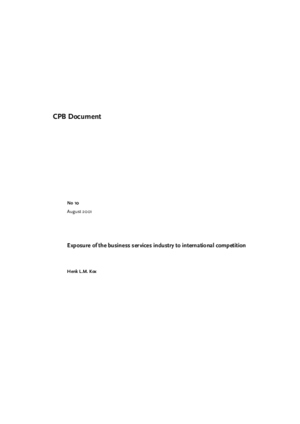Exposure of the business services industry to international competition
Kansen voor zakelijke dienstverlening bij internationale marktliberalisering
Reduction of such market barriers may yield welfare gains such as lower prices for client industries, gains in operational efficiency, and positive spillover effects as to technology, knowledge and product quality. The Dutch business services industry is in a good position to benefit from international market liberalisation, because it is already accustomed to a large degree of foreign competition in its home market.
These findings emerge from the CPB Document 'Exposure of the business services industry to international competition', to be released today.
The business services industry is one of the fastest growing industries in the Netherlands. The sector is composed of branches as different as software houses, accountants, engineering consultants and industrial cleaning firms. The business services industry increasingly operates beyond national borders. Large firms expand primarily through setting up foreign subsidiaries, while medium-sized firms depend more on exports. Small specialist firms operating in international niche markets also use exports as the preferred form of internationalisation. In their home markets, large business services companies tend to be more exposed than other firms to international competition from foreign subsidiaries.
Three factors limit the extent of foreign competition in national markets:
- First, for technical reasons, not all business services products can be traded internationally. While the ICT revolution makes it possible to send some products electronically, other products really have to be delivered abroad by the provider.
- A second barrier to foreign competition stems from the importance of business reputations in the market for business services. Since products often are not standardised and prices are difficult to compare, the purchasing decision often builds on hearsay experience from comparable clients. For small and medium-sized firms it is not easy to break through this information barrier in a foreign market.
- National market regulations form a third limiting factor to foreign competition. This is especially important in the markets for knowledge-intensive professional services like accountancy, legal and tax consultancy, architecture and engineering. Countries still specify many regulations, for example qualification requirements for service suppliers, standards of professional competence, and regulations with regard to competitive conditions. The fact that these regulations differ considerably between countries, acts as a barrier to international competition. Moreover, foreign providers of professional services often are subject to additional requirements, like the need to have a local office, nationality and re-qualification requirements for personnel, and restrictions on foreign ownership. Though often unintended, such regulations effectively hinder foreign imports and the establishment of foreign subsidiaries.
The Netherlands and the United Kingdom tend to have the most open markets for business services imports. Foreign firms meet few obstacles in setting up a local subsidiary. An early exposure to foreign competition has resulted in efficiency and learning-curve effects. Therefore, Dutch firms in business services are in a good position to benefit from future market deregulation and liberalisation in foreign markets.
Read also the accompanying press release.
The theoretic framework offers a micro-foundation for internationalisation decisions by individual firms, in particular the choice between exporting, licensing one's product to an independent foreign supplier, and setting up own production in a foreign subsidiary. The framework accounts allows for the importance of intangible assets in competition process, as is found in many knowledge-intensive branches of the business services (BS) industry. The presence of intangible assets strengthens the urgency of having a local presence in foreign markets. The theory predicts that the exposure of BS industry to foreign competition will increasingly get the form of direct investment instead of imports or licensing agreements. The theoretic framework stood up quite well against the empirical data in the BS industry. The growth of domestic BS markets correlates negatively with the import share in total supply and positively with the share of foreign subsidiaries in domestic supply.
National regulations have a substantial impact on trade and direct investment patterns in the BS industry. Regulatory interventions either operate directly through laws or indirectly, by delegating the regulatory powers to national branch associations. This is particularly important for knowledge-intensive BS branches. Foreign BS suppliers often have to comply with several additional regulations that function as non-tariff barriers to national BS markets. Strong differences exist between countries as to the strictness of market regulations for BS industry. The Dutch and UK markets for business services are among the most liberalised ones.
Large net welfare gains for national economies can be achieved by allowing more competition from foreign BS suppliers: technology and knowledge spillovers from abroad, better services quality, more competition in domestic BS markets, scale-related cost advantages, and cheaper intermediary BS inputs for client industries. Buyer protection for some knowledge-intensive professional business services can be shaped in a more non-discriminatory way than is the case now. On balance, removal of remaining barriers for imports of BS products and foreign subsidiaries is expected to have positive net welfare effects. Dutch BS firms are in a good position to benefit from future deregulation and liberalisation of BS industry in other OECD countries.
